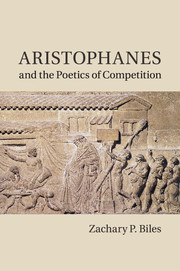17 results
Contributors
-
-
- Book:
- The Cambridge Companion to Greek Comedy
- Published online:
- 05 June 2014
- Print publication:
- 12 June 2014, pp xii-xvi
-
- Chapter
- Export citation
2 - The rivals of Aristophanes and Menander
- from Part I - Setting the stage (in Athens and beyond)
-
-
- Book:
- The Cambridge Companion to Greek Comedy
- Published online:
- 05 June 2014
- Print publication:
- 12 June 2014, pp 43-59
-
- Chapter
- Export citation
Index of passages
-
- Book:
- Aristophanes and the Poetics of Competition
- Published online:
- 25 January 2011
- Print publication:
- 27 January 2011, pp 285-290
-
- Chapter
- Export citation
6 - Dionysos and Dionysia in Frogs
-
- Book:
- Aristophanes and the Poetics of Competition
- Published online:
- 25 January 2011
- Print publication:
- 27 January 2011, pp 211-256
-
- Chapter
- Export citation
1 - From Thamyris to Aristophanes: the competitive poetics of the comic parabasis
-
- Book:
- Aristophanes and the Poetics of Competition
- Published online:
- 25 January 2011
- Print publication:
- 27 January 2011, pp 12-55
-
- Chapter
- Export citation
5 - Aristophanes' Clouds-palinode
-
- Book:
- Aristophanes and the Poetics of Competition
- Published online:
- 25 January 2011
- Print publication:
- 27 January 2011, pp 167-210
-
- Chapter
- Export citation
2 - The competitive partnership of Aristophanes and Dikaiopolis in Acharnians
-
- Book:
- Aristophanes and the Poetics of Competition
- Published online:
- 25 January 2011
- Print publication:
- 27 January 2011, pp 56-96
-
- Chapter
- Export citation
General index
-
- Book:
- Aristophanes and the Poetics of Competition
- Published online:
- 25 January 2011
- Print publication:
- 27 January 2011, pp 280-284
-
- Chapter
- Export citation
Frontmatter
-
- Book:
- Aristophanes and the Poetics of Competition
- Published online:
- 25 January 2011
- Print publication:
- 27 January 2011, pp i-vi
-
- Chapter
- Export citation
3 - Aristophanes' poetic tropaion: competitive didaskalia and contest records in Knights
-
- Book:
- Aristophanes and the Poetics of Competition
- Published online:
- 25 January 2011
- Print publication:
- 27 January 2011, pp 97-133
-
- Chapter
- Export citation
Contents
-
- Book:
- Aristophanes and the Poetics of Competition
- Published online:
- 25 January 2011
- Print publication:
- 27 January 2011, pp vii-vii
-
- Chapter
- Export citation
Bibliography
-
- Book:
- Aristophanes and the Poetics of Competition
- Published online:
- 25 January 2011
- Print publication:
- 27 January 2011, pp 257-279
-
- Chapter
- Export citation
4 - Intertextual biography in the rivalry of Cratinus and Aristophanes
-
- Book:
- Aristophanes and the Poetics of Competition
- Published online:
- 25 January 2011
- Print publication:
- 27 January 2011, pp 134-166
-
- Chapter
- Export citation
Acknowledgments
-
- Book:
- Aristophanes and the Poetics of Competition
- Published online:
- 25 January 2011
- Print publication:
- 27 January 2011, pp viii-ix
-
- Chapter
- Export citation
List of abbreviations
-
- Book:
- Aristophanes and the Poetics of Competition
- Published online:
- 25 January 2011
- Print publication:
- 27 January 2011, pp x-xii
-
- Chapter
- Export citation
Introduction: proagon
-
- Book:
- Aristophanes and the Poetics of Competition
- Published online:
- 25 January 2011
- Print publication:
- 27 January 2011, pp 1-11
-
- Chapter
- Export citation

Aristophanes and the Poetics of Competition
-
- Published online:
- 25 January 2011
- Print publication:
- 27 January 2011



